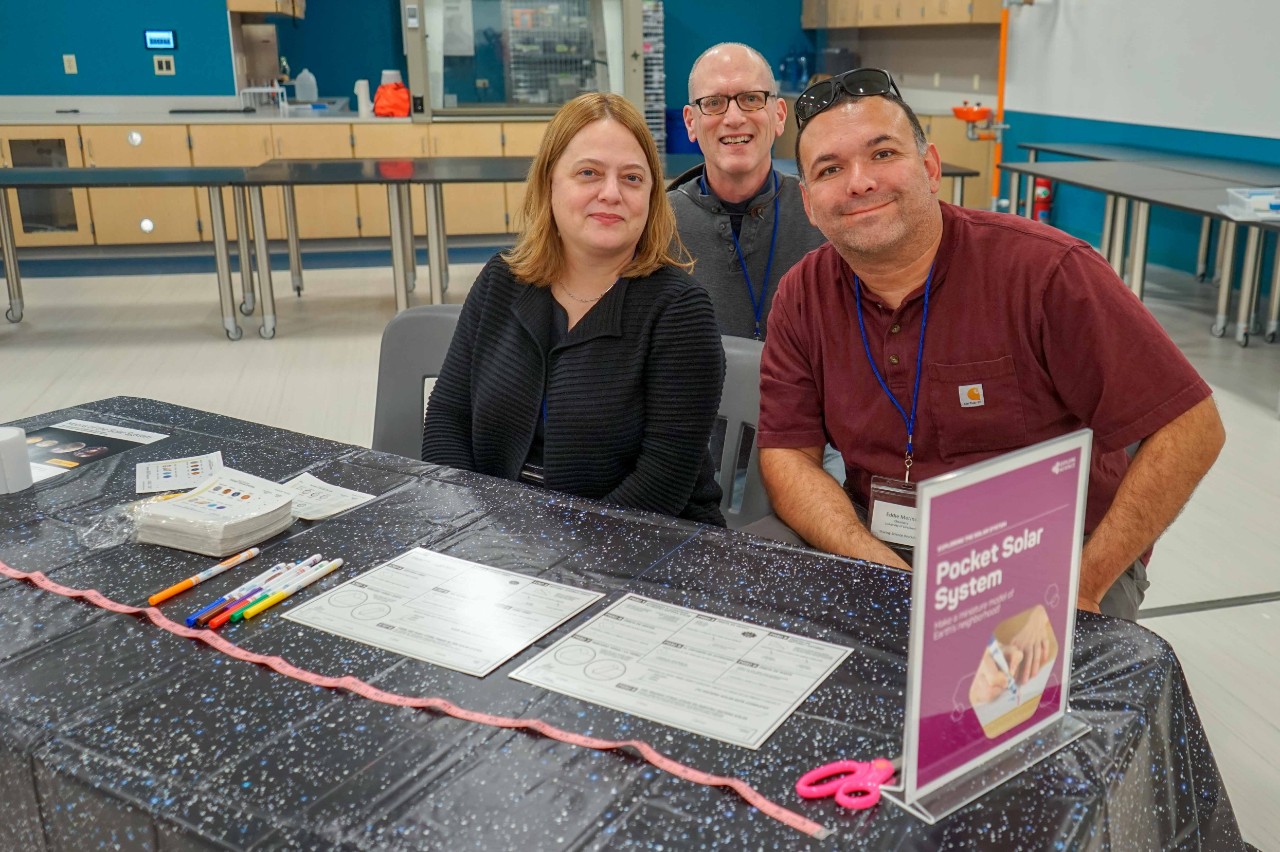
UC professors practice science outreach at museum
Fifteen professors from the University of Cincinnati participated in a science communication workshop last week at the Cincinnati Museum Center.
An interdisciplinary grant from UC's Office of the Provost and the McMicken College of Arts and Sciences funded the event, “Sharing Science Workshop and Practicum,” which included presentations, discussions and hands-on demonstrations with museum guests, many of whom were children.
The event reflected the academic excellence and urban impact platforms of UC’s strategic direction, Next Lives Here.

UC Senior Grant Administrator Cindy Treacy and professor Theresa Culley assist a child with a rocket launch demonstration at the Cincinnati Museum Center. An interdisciplinary grant from the Office of the Provost and the College of Arts and Sciences funded the day. Photo/Brandon Pytel/CEAS Marketing
“The goal is to improve science skills, and one way to do that is by doing science outreach,” said Brian Pollock, manager of museum experience at the Museum of Natural History and Science. “Science takes this really broad experience, and the public gets to see that.”

UC physics professors Colin Bischoff and Joachim Brod put on a temperature mapping demonstration for children. Photo/Brandon Pytel/CEAS Marketing
Pollock highlighted the difference between communicating with peers and broader audiences. Understanding this context can drive engagement and even encourage science as a future career for many children.
“Scientists don’t all wear lab coats and have big white beards,” Pollock said. “Science outreach allows us to put scientists out in the public, so people can get an accurate representation of what a scientist is and see themselves as one.”
UC faculty and staff from biological sciences, chemistry, psychology, physics, communication and philosophy shared their own experiences and challenges in communicating science and picked up tips to improve their approach. By the end of the day, they faced the ultimate test of learning: putting on demonstrations for children.
In a room open to all museum guests, professors used interactive science kits to explain difficult concepts like the expanding universe, static electricity and temperature mapping. To engage with the children, the UC professors applied strategies they learned earlier in the day, like asking open-ended questions, using positive language and relating science to everyday experience.

UC professor Dieter Vanderelst instructs a child for a static electricity demonstration. Photo/Brandon Pytel/CEAS Marketing
“I loved the enthusiasm of the kids,” said one of the professors, who put on a rocket launch demonstration.
The day ended with a conversation on how to maintain and increase science outreach efforts, especially with the changing interests and methods of communication of younger generations. Professors also talked about how to bridge the gaps between science and humanities for future projects.
Universities and museums have a responsibility to educate the public. Workshops between UC and the Cincinnati Museum Center can help fulfill this goal while empowering the next generation of scientists and engineers.
Featured image at top: UC professors Stephanie Rollman, Steve Depoe and Eddie Merino pose at the Sharing Science Workshop event at the Cincinnati Museum Center. Photo/Brandon Pytel/CEAS Marketing

UC postdoctoral researcher Melissa Jacquart and UC professor Adam Aurisano engage with children at the Science Sharing Workshop. Photo/Brandon Pytel/CEAS Marketing
Next Lives Here
The Sharing Science Workshop and Practicum event reflected the academic excellence and urban impact platforms of UC’s strategic direction, Next Lives Here.
Related Stories
Love it or raze it?
February 20, 2026
An architectural magazine covered the demolition of UC's Crosley Tower.
Before the medals: The science behind training for freezing mountain air
February 19, 2026
From freezing temperatures to thin mountain air, University of Cincinnati exercise physiologist Christopher Kotarsky, PhD, explained how cold and altitude impact Olympic performance in a recent WLWT-TV/Ch. 5 news report.
Discovery Amplified expands research, teaching support across A&S
February 19, 2026
The College of Arts & Sciences is investing in a bold new vision for research, teaching and creative activity through Discovery Amplified. This initiative was launched through the Dean’s Office in August 2024, and is expanding its role as a central hub for scholarly activity and research support within the Arts & Sciences (A&S) community. Designed to serve faculty, students, and staff, the initiative aims to strengthen research productivity, foster collaboration, and enhance teaching innovation. Discovery Amplified was created to help scholars define and pursue academic goals while increasing the reach and impact of A&S research and training programs locally and globally. The unit provides tailored guidance, connects collaborators, and supports strategic partnerships that promote innovation across disciplines.
